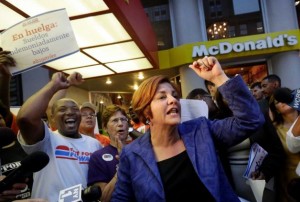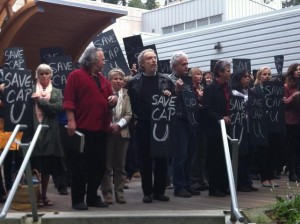
Michael A. Peters, TruthOut, August 17, 2013– The New York Times dubbed 2012 the year of the MOOCs – massive open online courses. Suddenly the discourse of MOOCs and the future of the university hit the headlines with influential reports using the language of “the revolution to come.” Most of these reports hailed the changes and predicted a transformation of the delivery of teaching and higher education competition from private venture for-profit and not-for-profit partnerships. Rarely did the media focus on questions of pedagogy or academic labor. This article suggests that MOOCs should be seen within the framework of postindustrial education and cognitive capitalism where social media has become the dominant culture.
Ernst & Young’s Universities of the Future carries the line, “A thousand year old industry on the cusp of profound change.” The report suggests that the current Australian university model “will prove unviable in all but a few cases.” It identifies five major “drivers of change”: democratization of knowledge and access, contestability of markets and funding, digital technologies, global mobility and integration with industry.
With the driver “digital technologies,” the report mentions MOOCs specifically as transformative of the way education is delivered and accessed and how “value” is created by higher-education providers. Clearly, this feature also is systematically related to the other features. I do not have the space here to evaluate this report except to say that it is self-serving in that it favors the privatization of education.
In An Avalanche is Coming: Higher Education and the Revolution Ahead, Michael Barber, Katelyn Donnelly and Saad Rizv, like the Ernst and Young, report, use the language of “revolution” to describe the changes about to transform higher education. Lawrence Summers, president emeritus of Harvard University who writes the foreword, suggests that An Avalanche is Coming correctly predicts the impending transformation:
Just as we’ve seen the forces of technology and globalisation transform sectors such as media and communications or banking and finance over the last two decades, these forces may now transform higher education. The solid classical buildings of great universities may look permanent but the storms of change now threaten them.
Michael Barber, one-time education adviser to Tony Blair and now consultant for the giant education publisher Pearson, signals that the functions of the traditional university are being “unbundled” – which means that some universities will need to specialize solely in teaching. Barber and his colleagues mention emergent forms of the university: the elite university, the mass university, the niche university, the local university, the lifelong learning mechanism. For Barber and his colleagues, MOOCs are symbolic of an avalanche: “Just as an avalanche shapes the mountain, so the changes ahead will fundamentally alter the landscape for universities.” With the student consumer as king, the growth of MOOCs and a more global system that makes up a leading part of the growth of the knowledge economy, “the new world the learner” will choose an education in a global marketplace with an “eye trained on value.”
The New York Times “Schools for Tomorrow” Conference to be held September 17, 2013, focuses on “Virtual U: The Coming of Age of Online Education.” The opening plenary asks “Is Online Education The Great Equalizer?” and provides the following primer:
There is no doubt that we are in the middle of an online education revolution, which offers huge potential to broaden access to education and therefore, in theory, level the playing field for students from lower-income, lower-privileged backgrounds. But evidence to date shows that the increasing number of poorly designed courses could actually have the reverse effect and put vulnerable students at an even bigger disadvantage.
This is to be followed with the debate: “Has The University As An Institution Had Its Day?” for which this description is added:
Higher education has always been an array of autonomous institutions, each with their own courses, their own faculty, and their own requirements for their own degrees. But online education is starting to break down those lines, in ways that are likely to lead to a lot more shared courses, consortia and credit transfers. In addition, there are a growing number of companies (not schools) providing higher education courses outside the traditional higher education institutions. As we move towards the possibility of a multi-institution, multi-credit qualification, is the traditional higher education institution in danger of losing applicants, income and identity?
The next agenda is devoted to “new era business models” including “an increasing assortment of new ventures offering for-profit schools, for-profit online courses, tests, curricula, interactive whiteboard, learning management systems, paid-for verified certificates of achievement, e-books, e-tutoring, e-study groups and more.” And finally, the conference is to address “Gamechangers: How Will Online Education Revolutionalize [sic] What We Know And Understand About Learning?” with this orientation:
Traditionally, pedagogical research has been done in tiny groups; but new-generation classes of 60,000 students make it possible to do large scale testing and provide potentially game-changing research on how students learn best. Using the big data from online courses, we have access to new information about what pedagogical approaches work best. MOOCs, and many more traditional online classes, can track every keystroke, every homework assignment and every test answer a student provides. This can produce a huge amount of data on how long students pay attention to a lecture, where they get stuck in a problem set, what they do to get unstuck, what format and pacing of lectures, demonstrations, labs and quizzes lead to the best outcomes, and so on. How can we use Big Data for the good of the education profession, and not for “Big Brother”?
In “MOOCs and Open Education: Implications for Higher Education” – a self-described “white paper” – Li Yuan and Stephen Powell embrace a balanced analysis that sees MOOCs as an extension of existing online learning approach, but one that has generated “significant interest from higher-education institutions and venture capitalists that see a business opportunity to be exploited” that offer scalability and new business models of open education, enabling the disaggregation “of teaching from assessment and accreditation for differential pricing and pursuit of marketing activities.” They embrace the theory of disruptive innovation (Bower & Christensen, 1995) to explain why some innovations can disrupt existing markets at the expense of incumbent players and suggest that current UK policy through a radical agenda allows “new, for-profit providers to enter the higher education market.”
Read More: TruthOut

 Follow
Follow



